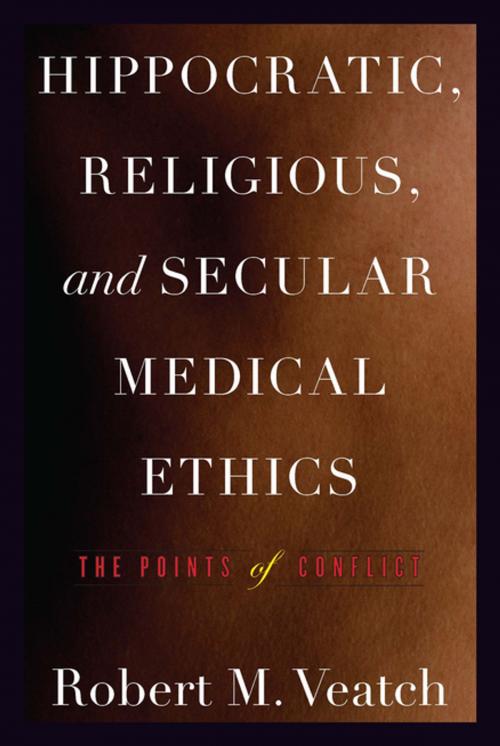Hippocratic, Religious, and Secular Medical Ethics
The Points of Conflict
Nonfiction, Health & Well Being, Medical, Reference, Ethics| Author: | Robert M. Veatch | ISBN: | 9781589019478 |
| Publisher: | Georgetown University Press | Publication: | October 9, 2012 |
| Imprint: | Georgetown University Press | Language: | English |
| Author: | Robert M. Veatch |
| ISBN: | 9781589019478 |
| Publisher: | Georgetown University Press |
| Publication: | October 9, 2012 |
| Imprint: | Georgetown University Press |
| Language: | English |
Where should physicians get their ethics? Professional codes such as the Hippocratic Oath claim moral authority for those in a particular field, yet according to medical ethicist Robert Veatch, these codes have little or nothing to do with how members of a guild should understand morality or make ethical decisions. While the Hippocratic Oath continues to be cited by a wide array of professional associations, scholars, and medical students, Veatch contends that the pledge is such an offensive code of ethics that it should be summarily excised from the profession. What, then, should serve as a basis for medical morality?
Building on his recent contribution to the prestigious Gifford Lectures, Veatch challenges the presumption that professional groups have the authority to declare codes of ethics for their members. To the contrary, he contends that role-specific duties must be derived from ethical norms having their foundations outside the profession, in religious and secular convictions. Further, these ethical norms must be comprehensible to lay people and patients. Veatch argues that there are some moral norms shared by most human beings that reflect a common morality, and ultimately it is these generally agreed-upon religious and secular ways of knowing—thus far best exemplified by the 2005 Universal Declaration on Bioethics and Human Rights—that should underpin the morality of all patient-professional relations in the field of medicine.
Hippocratic, Religious, and Secular Medical Ethics is the magnum opus of one of the most distinguished medical ethicists of his generation.
Where should physicians get their ethics? Professional codes such as the Hippocratic Oath claim moral authority for those in a particular field, yet according to medical ethicist Robert Veatch, these codes have little or nothing to do with how members of a guild should understand morality or make ethical decisions. While the Hippocratic Oath continues to be cited by a wide array of professional associations, scholars, and medical students, Veatch contends that the pledge is such an offensive code of ethics that it should be summarily excised from the profession. What, then, should serve as a basis for medical morality?
Building on his recent contribution to the prestigious Gifford Lectures, Veatch challenges the presumption that professional groups have the authority to declare codes of ethics for their members. To the contrary, he contends that role-specific duties must be derived from ethical norms having their foundations outside the profession, in religious and secular convictions. Further, these ethical norms must be comprehensible to lay people and patients. Veatch argues that there are some moral norms shared by most human beings that reflect a common morality, and ultimately it is these generally agreed-upon religious and secular ways of knowing—thus far best exemplified by the 2005 Universal Declaration on Bioethics and Human Rights—that should underpin the morality of all patient-professional relations in the field of medicine.
Hippocratic, Religious, and Secular Medical Ethics is the magnum opus of one of the most distinguished medical ethicists of his generation.















